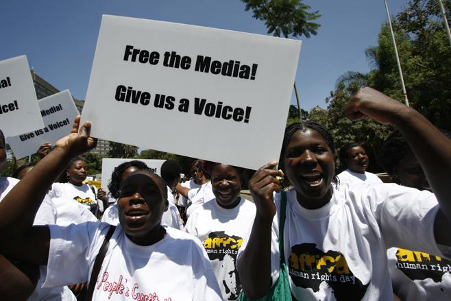Zimbabwe journalists decry bad media laws
Submitted by fkakooza on

Media experts in Zimbabwe have asked government to repeal the stringent media laws that hinder the free practice of journalism in the country.
Zenzele Ndebele, a broadcaster and media activist who runs the biggest online media outlet in Zimbabwe, said in a WhatsApp interview that several laws have affected media operations in the country.
“The most prohibitive laws include the Access to Information and Protection of Access to Privacy Act (AIPPA), the Criminal Codification Act, the Official Secrets Act, the Broadcasting Service Act and the Data Protection Act,” Ndebele said.
The AIPPA makes it difficult for journalists to get information. Although it was recently repealed, it was immediately replaced by a similar law. Other laws that infringe on the freedom of the media in Zimbabwe include the Broadcasting Service Act that governs the broadcasting regulations in the country. The other anti-press proposed law is The Cyber Security and Data Protection Bill which consolidates cyber related offences and is a data protection law for citizens, the government and the corporate organisations.
According to Methuseli Moyo, a former station manager of the state-owned Zimbabwe Broadcasting Corporation, now a lecturer of journalism at the Zimbabwe National University of Science and Technology, the Criminal Codification Act compels journalists to register with a state body every 12 months, and carries custodial sentences of up to five years for “crimes” committed in the trade of journalism.
Moyo further explained that the AIPPA, for instance, has all sorts of sanctions which include jail for anything deemed ridiculing the president. The AIPPA law deals with the registration of media forms from both local and foreign journalists. “Trading licenses can be denied or withdrawn under this law. This situation on its own compromises freedom of the press,” Moyo noted.
For many years, journalists have criticized and called for repeal of the bad laws. However, the so-called subsequent “amendments” bring back the same stringent laws.
Moyo noted that state broadcasters are “not” affected because they are managed directly by the state and headed by pliant political appointees. “I have never seen a state journalist being arrested for going against a media law. They can write what they want; these laws are not meant for them,” Zenzele Ndebele said.
However, state journalists have also been abused physically and verbally by opposition leaders and their agents who consider them to be part of the ruling party.
Nonetheless state broadcasters cannot criticize the government in anyway because they are part of the system. He also said that such laws must be “abolished altogether and journalism left to operate like any other trade. Journalists are capable of regulating themselves, they are professionals.”
- 439 reads
